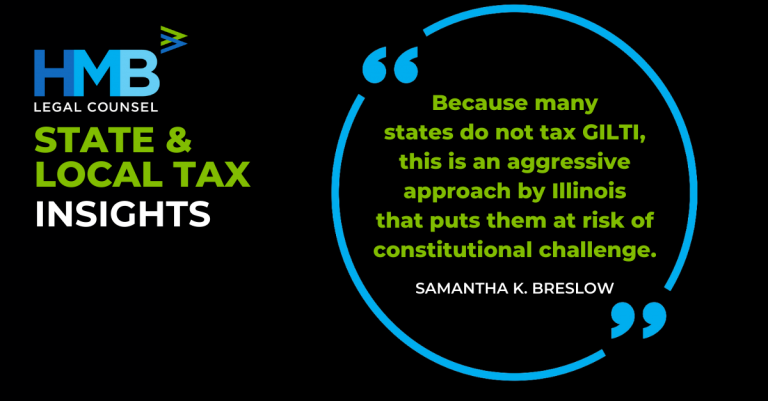In an article by Law360, Samantha K. Breslow discusses Illinois Lawmakers approving the budget with GILTI addback. Read the full article by Law360 here.
Illinois would require an addback for certain global intangible low-taxed income deductions, halt a phaseout of its franchise tax and temporarily cap net operating loss deductions under a $42.3 billion fiscal year 2022 budget that lawmakers approved Tuesday.
Under the bill, Illinois would impose an annual $100,000 net operating loss deduction limit through tax year 2024, stop a phaseout of the state's franchise tax — which was scheduled to roll off the books in 2025 — and reduce foreign-source dividend deductions to align them with deductions for domestic dividends. The measure would also decouple from the 100% depreciation deduction allowed under Internal Revenue Code Section 168(k).
Together, those provisions are estimated to lead to an extra $655 million in state revenue for the next fiscal year. Pritzker told reporters during a news conference Tuesday that those elements of the budget, which he billed as closing "tax loopholes," along with generally flat spending and higher-than-expected revenue collections during the coronavirus pandemic will help improve the state's long-term finances.
The franchise tax, which is separate from the corporate income tax, is administered by the Illinois secretary of state's office and imposed on paid-in capital. The tax is unique and "can be an unwelcome surprise" for businesses, particularly those engaging in mergers or acquisitions because there's no limit for tax when there are increases in paid-in capital, Samantha K. Breslow said.
"Although Governor Pritzker framed the bill as closing corporate tax 'loopholes,' the Illinois franchise [tax] has historically functioned as a 'gotcha' tax for corporations, not the other way around," she said.
Regarding the deductions for GILTI and foreign-sourced dividends, Pritzker had said that rolling back the deductions to bring their tax treatment more in line with domestic dividends would stop favoring dividends that are received from sources in other countries over those sourced in the U.S.
Samantha noted that the Illinois Department of Revenue specified in 2018 that the state's subtraction for foreign dividends would apply to GILTI, which was part of the 2017 federal Tax Cuts and Jobs Act , and Illinois conforms to the federal code on a rolling basis. But starting for tax years ending on or after June 30, 2021, the bill would require taxpayers to add back GILTI deductions allowed under IRC Section 250(a)(1)(B)(i) when computing their Illinois base income.
"With a significant budget deficit expected for the 2022 fiscal year, the goal here is clearly to recoup income," she said. "But because many states do not tax GILTI, this is an aggressive approach by Illinois that puts them at risk of constitutional challenge, particularly under the foreign commerce clause."
It remains to be seen whether Illinois will allow factor representation for apportionment or if the state will exclude GILTI from apportionment altogether, Breslow said. She added that unless clarifying guidance is issued "this could result in inconsistent filing positions and an uptick in audit activity."



